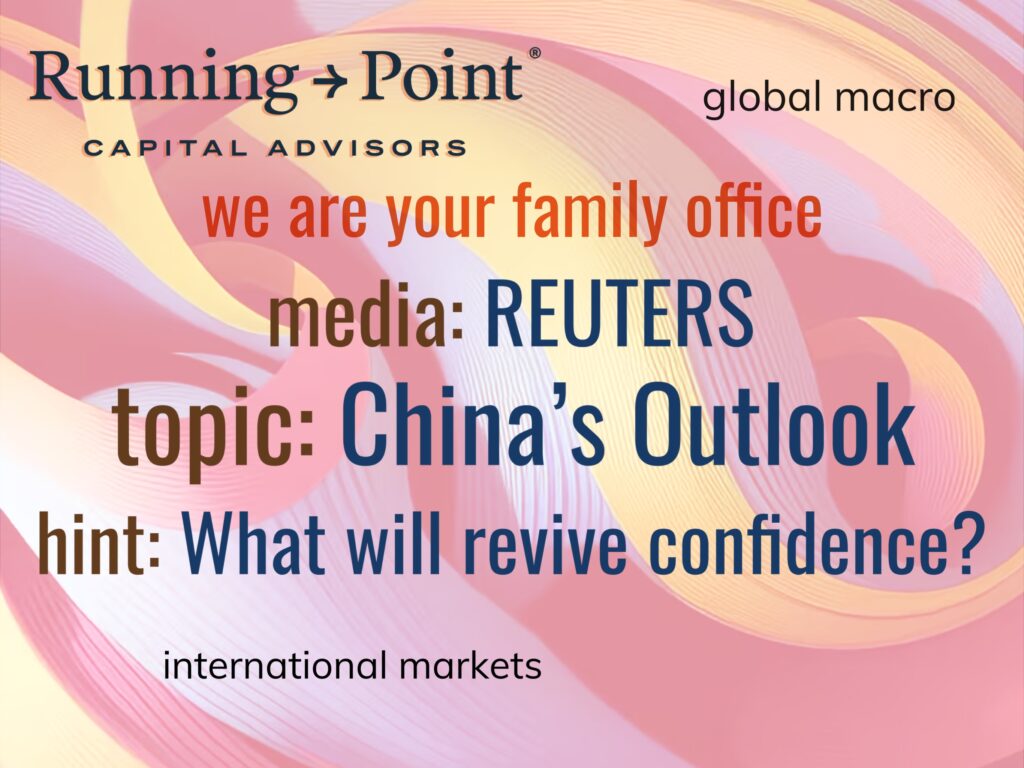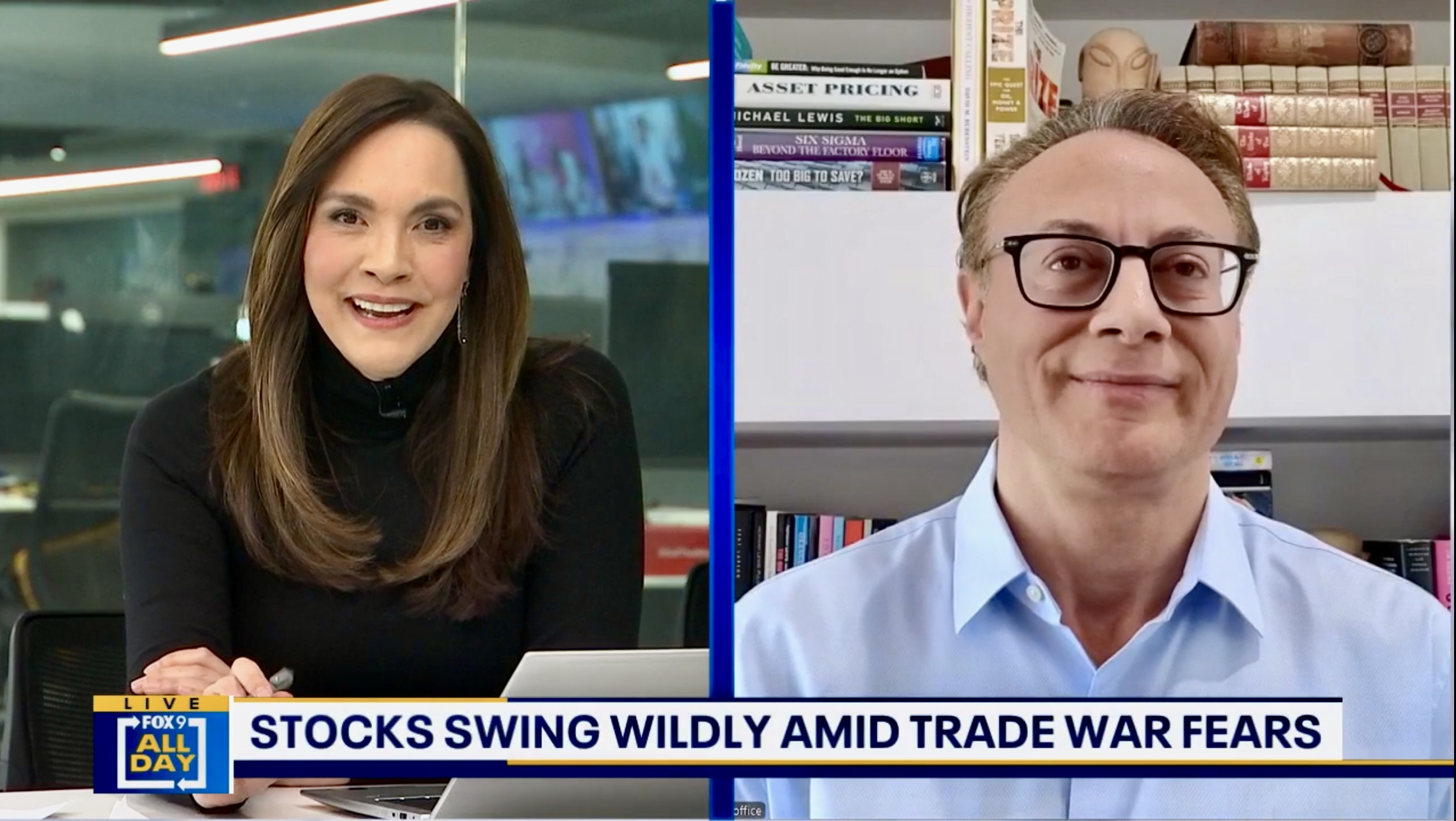Chinese stocks, multi-year lows
Running Point and its chief investment officer, Michael Ashley Schulman, CFA, were quoted by Reuters in an article — by Tom Westbrook and Summer Zhen, “Why China’s national team won’t save spiralling markets” — regarding whether a stabilization fund could revive investor confidence and what other changes global investors desire to again turn bullish toward Chinese equities.
The article was also picked up by NASDAQ, MSN, U.S.News, Investing.com, FastBull, XM, The Globe & Mail (Canada), ES Euro, ZoneBourse (France), MarketScreener (Italy), InfoStock and Novini247 (Bulgaria), Moscow Times, Наш Курск, and Financial One (Russia), BizMedia (Kazakhstan), Malay Mail, Channel NewsAsia, Tai Sounds (Taiwan), and FireAnt and Báo Mới (Vietnam), amongst others.
China’s path
Chinese President Xi Jinping emphasized commitment to China’s distinct financial development path during an annual study session, highlighting its divergence from the West. As expected, Xi outlined his vision of a financial superpower based on a robust economic foundation, world-leading economic, technological, and national strength.
Investors need to discern the effects and influences of China vs. China, China vs. the U.S., and China vs. India.
Deflation, decoupling, and debt
China’s GDP deflator fell by 1.5% in Q4 2023, the longest decline since 1999, indicating a potential recession. Despite Premier Li Qiang’s optimistic 5.2% economic growth announcement at Davos, deflation is evident in recent Q4 data. China faces global challenges including decoupling from the West, foreign capital withdrawal, US tech restrictions, and new snags in China’s massively expensive 11-year old Belt and Road Initiative (BRI) as Italy pulled out and security concerns in Pakistan make headlines. Strong growth, even if achieved, is unlikely to alleviate China’s mounting bad debt. Beijing’s struggle for structural changes leans towards credit-fueled stimulus, raising concerns about achieving desired outcomes.
Key concerns
The crisis-mired property sector remains a key concern, with weak sales, default risks, and a consensus among major financial institutions projecting a continued slump in 2024. Despite government efforts, the pessimistic outlook signals ongoing economic challenges. All this begs the question of whether their “Made in China 2025” economic development strategy is at risk. Additionally, demographic concerns, with deaths outnumbering births by the largest margin in history, pose long-term expansion challenges on par with Europe.
Rescue package?
Amid rumors of a $278 billion stock market rescue package, state-owned banks in China are expected to buy onshore stocks to counter a $6 trillion market rout since 2021. Beijing’s surprising measures to boost the stock market include potential state-owned enterprise fund use, executive evaluation based on stock market value, and efforts to open the financial industry to international investors. The central bank’s unexpected move to slash cash reserves resulted in a market upturn that could have legs; thus, over the short to medium term we may see stocks move up even if long-term economic ills are not immediately cured.
Crisis of confidence
While the recent measures provided short-term relief, investors remain cautious about long-term economic prospects. Six months of consecutive outflows, totaling $30 billion in foreign institutional sales of mainland Chinese shares, indicate persistent concerns.
Sinking property values impact confidence, limiting available capital for investments. Beijing’s historical market interventions have shown short-lived impacts, raising uncertainty about the package’s real value.
Growth as a cure
However, growth can cure most ailments, including a ginormous debt load. If China can stimulate real domestic growth, lean on global economic expansion, and increase confidence, they should have a path that’s up and to the right. PBOC Governor Pan Gongsheng was clear about the central bank’s direction, emphasizing that the PBOC is deeply concerned about deflation and sees a pressing need to ease monetary policy and steer credit where needed. Ironically, any easing of interest rates from the U.S. Federal Reserve could also help China by stimulating global growth/demand. All economies go through their cyclical ups and downs; if properly wielded, China has the tools to turn things around and surprise the world yet again.
The India question
While most people in the U.S. are focused on America versus China, the real challenge may be an Indo-Pacific one as the battle shifts towards India versus China on the global stage for products, services, and diversification of supply chains. India has a much younger population and is growing so quickly it will surpass Japan as the third-largest economy before the end of the decade. The comparison between China and India is not one of simple contrasts and similarities; there are multiple layers of complex history and politics too.
Article excerpts are below:
“Consumers face multiple crises of confidence in debt, property, and employment, emphasising the multifaceted challenges confronting China’s economy,” said Michael Ashley Schulman, partner & CIO of Running Point Capital Advisors.
“The effectiveness of the market rescue … is questionable if it does not address weak aggregate demand or the deeper issues in the property market,” he said. “Beijing’s historical market interventions have shown short-lived impacts.”
~~~
In Bulgarian: „Потребителите са изправени пред множество кризи на доверие в дългове, собственост и заетост, подчертавайки многостранните предизвикателства, пред които е изправена икономиката на Китай“, каза Майкъл Ашли Шулман, партньор и ИТ директор на Running Point Capital Advisors.
„Ефективността на спасяването на пазара… е под въпрос, ако не адресира слабото съвкупно търсене или по-дълбоките проблеми на пазара на имоти“, каза той. „Историческите пазарни интервенции на Пекин показаха краткотрайни въздействия.“
~~~
In Russian: «Потребители сталкиваются с множественным кризисом доверия в вопросах долга, недвижимости и занятости, что подчеркивает многогранность проблем, стоящих перед экономикой Китая, – сказал Майкл Эшли Шульман из Running Point Capital Advisors. – Как показывает история, интервенции Пекина на рынке имеют кратковременный эффект».
~~~
In Vietnamese: Michael Ashley Schulman, đối tác & CIO của Running Point Capital Advisors cho biết: “Người tiêu dùng phải đối mặt với nhiều cuộc khủng hoảng về niềm tin vào nợ, tài sản và việc làm, nhấn mạnh những thách thức nhiều mặt mà nền kinh tế Trung Quốc đang phải đối mặt”.
“Hiệu quả của việc giải cứu thị trường… là vấn đề đáng nghi ngờ nếu không giải quyết được tổng cầu yếu hoặc các vấn đề sâu xa hơn trên thị trường bất động sản. Những can thiệp vào thị trường trong lịch sử của Bắc Kinh đã cho thấy những tác động ngắn hạn”, ông cho biết.
~~~
In Chinese: 這種托持藍籌股的作法成效令人質疑。美國Running Point資本顧問公司投資長舒曼(Michael Ashley Schulman)說:「消費者面對因為債務、房地產、失業等多重問題造成的信心危機,凸顯出中國經濟面對的多重挑戰。如果不能解決需求衰弱的問題,救市措施的效果……很讓人質疑。」
彭博新聞先前在1月底報導披露,北京政府已經準備推出2兆人民幣(約8.82兆台幣)的救市平準基金,使用各國有企業、銀行的海外資產,投入中國股市進行托持。但是到目前為止,該平準基金仍未獲得官方正式宣布推出。

Failure is not falling down, but refusing to get up.
Chinese Proverb
Disclosure: The opinions expressed are those of Running Point Capital Advisors, LLC (Running Point) and are subject to change without notice. The opinions referenced are as of the date of publication, may be modified due to changes in the market or economic conditions, and may not necessarily come to pass. Past performance is not indicative of future results. Forward-looking statements cannot be guaranteed. Running Point is an investment adviser registered with the U.S. Securities and Exchange Commission. Registration does not imply a certain level of skill or training. More information about Running Point’s investment advisory services and fees can be found in its Form ADV Part 2, which is available upon request. RP-24-17


